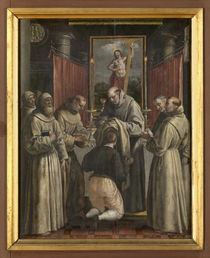The Catholic Defender: Saint Monica
- Donald Hartley

- Aug 26
- 4 min read
Updated: Aug 27
Deepertruth with special permission and aid with Franiciscan Media, a great team for the Lord

St. Monica is the patron saint of alcoholics, victims of abuse and adultery, widows, and mothers facing family difficulties. Her relics rest in the reliquary chapel in the Basilica.
Exemplary Mother of the Great Augustine, you perseveringly pursued your wayward son, not with threats, but with prayerful cries to heaven. Intercede for all mothers in our day so that they may learn to draw their children to God.
Patron: Abuse victims; alcoholics; alcoholism; difficult marriages; disappointing children; homemakers; housewives; married women; mothers; victims of adultery; victims of unfaithfulness; victims of verbal abuse; widows; wives. Symbols: Monstrance; IHC on a tablet; veil or handkerchief; open book; girdle; staff; tears.
Monica is recognized as the patron saint of mothers. Her faith and dedication to motherhood played a pivotal role in the spiritual formation of one of the most brilliant philosophers and well-known saints of all time – Saint Augustine, her son.
She was able to grow in these two virtues because of her love for the Lord and her son. All of the actions and decisions in her earthly life were grounded in the theological virtues of faith, hope, and love. As an exemplar of maternal virtue, Saint Monica is a model for all mothers.
Monica is also an example of profound patience. She prayed for St. Augustine for 17 years, and for her husband and mother-in-law even longer. That is beautiful to us, who know the end of the story, but imagine what it must have felt like during year 16.
The circumstances of St. Monica’s life could have made her a nagging wife, a bitter daughter-in-law, and a despairing parent, yet she did not give way to any of these temptations. Although she was a Christian, her parents gave her in marriage to a pagan, Patricius, who lived in her hometown of Tagaste in North Africa. Patricius had some redeeming features, but he had a violent temper and was licentious.
Monica also had to bear with a cantankerous mother-in-law who lived in her home. Patricius criticized his wife because of her charity and piety, but always respected her. Monica’s prayers and example finally won her husband and mother-in-law to Christianity. Her husband died in 371, one year after his baptism.
Monica had at least three children who survived infancy. The oldest, Augustine, is the most famous. At the time of his father’s death, Augustine was 17 and a rhetoric student in Carthage. Monica was distressed to learn that her son had accepted the Manichean heresy—”all flesh is evil”—and was living an immoral life. For a while, she refused to let him eat or sleep in her house. Then one night she had a vision that assured her Augustine would return to the faith. From that time on, she stayed close to her son, praying and fasting for him. In fact she often stayed much closer than Augustine wanted.
When he was 29, Augustine decided to go to Rome to teach rhetoric. Monica was determined to go along. One night he told his mother that he was going to the dock to say goodbye to a friend. Instead he set sail for Rome. Monica was heartbroken when she learned of Augustine’s trick, but she still followed him. She arrived in Rome only to find that he had left for Milan. Although travel was difficult, Monica pursued him to Milan.
In Milan, Augustine came under the influence of the bishop, St. Ambrose, who also became Monica’s spiritual director. She accepted his advice in everything and had the humility to give up some practices that had become second nature to her. Monica became a leader of the devout women in Milan as she had been in Tagaste.
She continued her prayers for Augustine during his years of instruction. At Easter 387, St. Ambrose baptized Augustine and several of his friends. Soon after, his party left for Africa. Although no one else was aware of it, Monica knew her life was near the end. She told Augustine, “Son, nothing in this world now affords me delight. I do not know what there is now left for me to do or why I am still here, all my hopes in this world being now fulfilled.” She became ill shortly after and suffered severely for nine days before her death.
Almost all we know about St. Monica is in the writings of St. Augustine, especially his Confessions.
St. Monica conducted herself with persistence, determination, and hopefulness. She wouldn't allow herself to get fed up, let up or give up. Instead, she looked up – to the Almighty – and trusted in him to guide and save her son.
In- tercede for me, dear St. Monica, that God may favorably hear my plea for (names of those you are praying for) and grant me the grace to accept His will in all things, through Jesus Christ, our Lord, in the unity of the Holy Spirit, One God forever and ever. Amen.
Lord Jesus, I come before you, just as I am; I am sorry for my sins, I repent of my sins, please forgive me. In your Name, I forgive all others for what they have done against me. I renounce Satan, the evil spirits, and all their works. I give you my entire self, Lord Jesus, now and forever.





















Comments